Cheryl Strayed didn’t start out to be a self-help writer.
In 2012, she was poised to be best known as the author of the forthcoming memoir "Wild", a book that sparked the return of Oprah's famed Book Club and would ultimately be turned into an Academy Award nominated film starring Reese Witherspoon.
Cheryl and Reese at the 2014 Golden Globes. Photo by Steve Granitz/Getty Images.
But one month before the book's release, the writer revealed herself to not just be a woman who had traveled the Pacific Crest Trail and written about it but also the anonymous columnist behind the wildly popular online advice column Dear Sugar. She would now forever be known as more than just a talented author. She was the woman who had helped thousands of strangers deal with some of the most intimate problems in their lives with unflinching honesty, humor, and compassion.
“Most things will be okay eventually, but not everything will be. Sometimes you’ll put up a good fight and lose. Sometimes you’ll hold on really hard and realize there is no choice but to let go. Acceptance is a small, quiet room.”
Shortly thereafter, a selection of those columns — her responses to letters about everything from grief, marriage, and incest to addiction, money, and sex — were compiled in the the New York Times best-selling "Tiny Beautiful Things: Advice on Love and Life from Dear Sugar," a book I've read so much the cover is hanging on by a thread. New York magazine called "Tiny Beautiful Things," "the self-help book women can't stop giving to each other" and it's now the basis for an upcoming HBO series of the same name.
Whether she planned to be or not, Cheryl Strayed has become an incisive, literary life advice guru with a cult-like following. And I am a proud member.
When she agreed to an interview, I was eager to talk to her about her new book "Brave Enough," a collection of her most beloved quotes. I had no idea we would somehow end up talking about everything from her relationship with her father and forgiveness, to finding an authentic voice, and even (brace yourself) thinking differently about Donald Trump.
But that's what happens when you talk to a woman whose main job is to study life, think about its lessons, and then share them. And so she did.
"OK, Erica. Do not act like a fan."
This is what I told myself as I prepared to call Cheryl for our interview.
"Don't babble on and on about how much her books have inspired you, and don't tell her how many of her quotes you've memorized."
Once I had sufficiently ticked through the list of don'ts in my head, I cleared my throat, got into professional interviewer mode, and dialed her number.
"Hi, this is Cheryl."
"Hi-Cheryl-it's-Erica-from-Upworthy-thanks-for-talking-to-me-today-I'm-such-a-fangirl."
Welp. So much for keeping it cool.
Thankfully, Strayed was incredibly warm and approachable, radiating humility. I wanted to know how someone so humble felt confident giving life advice to thousands of people.
On what it means to be human:
I asked whether she ever suffered from self-doubt and how she, someone not trained as a therapist or a counselor or a life coach, came to feel "qualified" to teach people important life lessons based on her own experiences.
"We get great and terrible advice from all sources all the time," she answered. "From your best friend who said something really important to you one time that really altered your way of thinking and the next conversation can say something that is idiotic and doesn’t make sense. We get advice from strangers, books, our parents, friends … all sources. I'm simply one source.
I never said that people need to do what I think they should do. I very seldom focus on instruction. I don’t feel that my main role is to say do this or do that. My main role is to help illuminate the question that they’re asking by exploring various avenues of seeking the answer.
It's about asking 'What does it mean to be human?' And in particular “What does it mean to be human in this situation? In this struggle?'"
I almost missed what she said next because I was so stuck on the phrase "What does it mean to be human?" It seemed to encapsulate all of the questions that we humans ask ourselves every day (How should we behave? How should we respond? What should we think? What should we feel?) in seven words.
I feel like she could make anything sound good, meaningful. But it also made me wonder how she, or anyone for that matter, knows what the right takeaway or lesson is. What is the best decision to make at any given moment in a complex situation or in a complex life if anything can be made to sound inspirational or "right"?
She paused and thought on that for awhile.
"Right before you called me, I was on a walk with my husband. I was grappling with a negative interaction I had with an acquaintance and feeling really annoyed and angry. But then there was also this other feeling of compassion for this person because I know [what she did] totally isn’t about me. That what she said is completely about her own sense of need and sorrow and fear. And so I have two experiences of the same interaction.
One of the great struggles of my life is which one do I land on? Do I land on the one that’s like 'F--k you bitch'? Or should I land on the one that’s like 'I understand that you’re suffering so I will let it go.'
Now that seems like a small thing but apply it to a big thing — my father being a terrible father, for example. Do I stay with rage, sorrow, and absence and suffering, or do I land on forgiveness, compassion, acceptance, and moving forward? We always have that choice."
I agreed. But I also believe that we teach people how to treat us. I worry that if we offer nothing but "niceness"in response to mistreatment or cruelty, we're in some ways letting them off the hook. And if we do that, will they ever learn the lesson? Without me even asking, she had an answer for that.
"What other people go through is not up to us. What we're going through is up to us. I'm not talking about denial," she assured me. "You still have to carry the story with you when you choose forgiveness, but the decision you’re making is to carry it with you forward into whatever beauty awaits. The deal of life is that life is always going to be full of suffering and joy. And I think when you focus on the suffering, you forget how much joy there really is. Always. There’s always joy. It’s always available to us, even in the darkest days."
Even in the darkest days.
The darkest days. That phrase stuck out to me because it drew my mind not only to personal life struggles but to all the hatred and violence and oppression and fear that permeates our current social and political landscape. Mass shootings, Islamophobia, police brutality... And really. Is there any other way to describe Donald Trump's candidacy other than the phrase "dark days"?
I asked her if the themes her quotes touch on, which are so often focused on people's personal lives, could apply to those big societal issues too.
"Yes," she said. And she picked our favorite cartoon villain political candidate to illustrate how.
Him. Photo by Ralph Freso/Getty Images.
On Donald Trump and the big things:
"We forget that Donald Trump — the guy saying all that awful stuff — that’s one human and that awful stuff rises from his heart. And the only way to change the world in the grand scale is to change the hearts and minds of individuals.
So what if this guy really took a deep look at his own wounds? He’s an example of someone who has decided to stay in rage, just like I was talking about earlier. So for him, a couple of people of the Muslim faith shoot up a center and [that behavior] now applies to people of that faith. He’s decided to tell a story that is about hate and ugliness and rage.
What if he were the kind of person who could make that tiny switch I was just talking about in my life, where you say 'am I going to stay in rage or am I going to go to that other place?' I don’t think Trump has ever made that leap probably in anything in his life. So it begins as a tiny thing. I don’t know him. I don’t know what happened to him in his life. But I know that probably all along the way he chose to tell an ugly, small, rage-filled story about himself and the people around him. And then it’s like a stone you throw in the water that resonates outward and beyond. And now it's on a massive scale. That’s why it’s so dangerous to give people power, to elect someone who doesn’t have a consciousness that is steeped in compassion and love and light."
I sighed. She was right. I'm not evolved enough yet to think about Donald Trump's wounds, but I made a mental note to revisit the idea post-election.
I was about to move the conversation forward, but something in my question about what some would call the "bigger" social issues had triggered her. She jumped back in.
"Also, I hate this idea that the culturally significant stories are about 'the big things.' Women are always up against that idea — that our stories are small or unimportant.
I think writing the truth about one life is a big thing. For four years there hasn’t been one day that a whole bunch of people haven’t told me 'your book changed my life.' And when you change someone’s life, you change the world. To believe in that change that we can make in our own lives is what leads to the cultural change in our world."
That sentiment echoes the late Detroit activist Grace Lee Boggs who famously said, "To make a revolution, people must not only struggle against existing institutions. They must make a philosophical/spiritual leap and become more 'human' human beings. In order to change/transform the world, they must change/transform themselves." I shared this with Cheryl.
"Yes! Yes!" she said.
Then she thought about it for a second and said that there was a myth she wanted to dispel.
"Transforming the self can easily be construed as this incredibly narcissistic activity."
I knew exactly what she meant. The me, me, me, navel-gazing, optimize-your-life culture around being your "best self" is everywhere. And it can be pretty insufferable.
"This idea that the most important thing is whatever it is YOU need, what YOU want, because you are developing your mind and your body and whatever. That’s bullshit. That’s not what transforming yourself is.
It isn’t about having the perfect ass and a world that never blows your head open and challenges you and transforms you. It's about engagement, questioning your motivations and beliefs, your biases, and it’s about struggle. And this is the kind of self-help that I’m signing up for and that I hope to contribute to.
It’s a grittier, messier way of looking at transformation. Not just sitting in a bathtub with candles burning, but that’s where you end. It’s not the journey. The journey is a lot rougher than that. It’s about being disrupted from your complacency."
On real self-help:
But that grittiness and messiness isn't what most of us think about when we hear the term "self-help." We often think of positive affirmations and "five steps to a better life," quick fixes. As writer who's a bit insecure about the fact that my own first book will likely land on the self-help shelf also, I desperately wanted to know: Is she comfortable being lumped into that category? How does someone who grew up obsessing over "the great writers" and began her career in fiction and literary nonfiction feel about her work being stuck with the label of a genre that is so often mocked?
"Not only did I never intend to be a self-help writer," she said, "I still don’t really think of myself in that way — probably because I have the same recoil that so many people do when we hear 'self-help.'
"I think when we think of self-help negatively we’re thinking of a book that simplifies and glosses over the complexity of the real, gritty problems of life that we all have. And instead of saying 'OK let’s get down in the muck and face these things,' it sort of makes silly metaphors out of things that are deep and important and big."
I nodded in agreement. She hit the nail on the head.
"Have you ever seen that famous SNL skit with the guy who goes 'I’m OK, and you’re OK?'" she asked.
I chuckled and told her that I had but didn't admit that, at my age, I'd only ever seen a 20-second clip of it on YouTube. But I knew what she was getting at.
“That’s what we think self-help is,” she continued. "A kind of anti-intellectualism."
"And I think that’s really unfair to the genre. Because so many books, my own included, that are lumped into that genre are aspiring to do the exact opposite of that glossing over: embrace our intellects and our rational thinking when it comes to figuring out our challenges and struggles, the relationships we have with others, and the complexity of the relationship that we have with our own past, our own selves, our own lives.
So I think that what people see when they are reading my words is somebody who is willing to not turn away from that complexity.”
Ultimately, she believes that [her] readers experience work in the same way, no matter what the publisher-assigned genre: viscerally and emotionally. And they judge it simply on whether it changes their lives.
Photo by Amy Graves/Getty Images.
On authenticity:
She's a writer who isn't afraid to talk about life's complexity. That's important. But the truth is that her popularity and resonance isn't just because of what she says. It's also about how she says it.
With quotes like this...
“But the reality is we often become our kindest, most ethical selves only by seeing what it feels like to be a selfish jackass first.”
...and this...
"You don’t have to get a job that makes others feel comfortable about what they perceive as your success. You don’t have to explain what you plan to do with your life. You don’t have to justify your education by demonstrating its financial rewards. You don’t have to maintain an impeccable credit score. Anyone who expects you to do any of those things has no sense of history or economics or science or the arts. You have to pay your own electric bill. You have to be kind. You have to give it all you got. You have to find people who love you truly and love them back with the same truth. But that’s all."
...and one of her most famous...
"So write. Not like a girl. Not like a boy. Write like a motherfucker."
it's easy to see why Cheryl is known for communicating ideas in a way that is somehow equally compassionate and unmerciful, gentle and brash. And her words are both literary in their beauty but incredibly simple at the same time. It's hard to tell what has mattered matter more in her ability to connect with readers: her writing style or her big personality. So I ask her.
“It’s both,” she replied confidently. "My voice, writing style, and personality are all one and the same."
She explained: "When you’re a young writer you’re always in search of your voice, and for a long time I thought that meant conforming my voice to the great writers I love. 'I’m going to try to sound like Faulkner or Alice Munro or Toni Morrison.' But what I loved in the work of the writers that I love most is that they’re relaxing and actually speaking with their own voice on the page. And the closer I could get to doing that, the better writer I become.
Voice and authority: It’s all about speaking out of your authentic knowledge."
And she wants to make sure that her authentic knowledge is accessible to everyone.
"I’ve always hoped that what complicates my work is the thinking behind it, not the language that I use to convey ideas. I’ve always wanted my work to be accessible to people of all backgrounds, regardless of their education. I love that you don’t have to be hyper-literate to read my books. You can be, but you don't have to be."
As an example of what she called her "approachability in public persona, on the page, and in actual life," she shared a moving memory:
"At one of my readings in Santa Cruz, this woman came up to me. She was a Mexican immigrant; she was a maid at a hotel. She told me that she had been cleaning a room and someone had left a copy behind of 'Wild.' Instead of just turning it in like they usually do, she started reading it and ended up reading the whole book. At my reading, she wept and said that she’d never read a book before.
And I've heard that many times. So I’m not interested in this idea of the writer as the exalted figure who's above any other person in the world."
Photo by Joe Scarnici/Getty Images.
On her favorite quote:
Later on in our conversation, as we discussed "Brave Enough," I realized she probably wouldn't have judged me for knowing so many of them by heart. The attachment that readers have had to her words is exactly what inspired the book in the first place.
"My publisher said 'all the people on the Internet keep posting your quotes everywhere — we should collect them.' The premise wasn’t 'I’m so wise.' It was crowdsourced! I believe that the power of art is connection. It’s people taking a writer's work and making it theirs. And that’s what people have done with these quotes, and so I looked to them for what should be in the book. I love the idea that a sentence I wrote told them something that they needed to know or hold in their heart.”
I wanted to end my discussion with Cheryl by finding out which pithy line from the collection was her personal favorite, the one that she holds closest in her heart.
As it turns out, it's the one that isn't technically hers. It is her late mother's quote. Her mother is a central figure in her work, and her too-sudden, too-soon death at age 45 not only shattered Cheryl's world but also sparked the life-changing journey of "Wild." When she mentioned her now, her words practically beamed, dripping with audibly noticeable adoration.
"Put yourself in the way of beauty."
"That is something that my mother told me to do. It took me years to really understand what that meant and to learn how to do it. My mom would say, 'It doesn’t matter how miserable you are, how hard any particular day is, you can always choose to put yourself in the way of beauty. There’s always a sunrise and there’s always a sunset. And it's up to you whether you want to be there for it or not. When it’s hardest is when you need to do it the most.'
And so I trust that. It's been a guiding light."






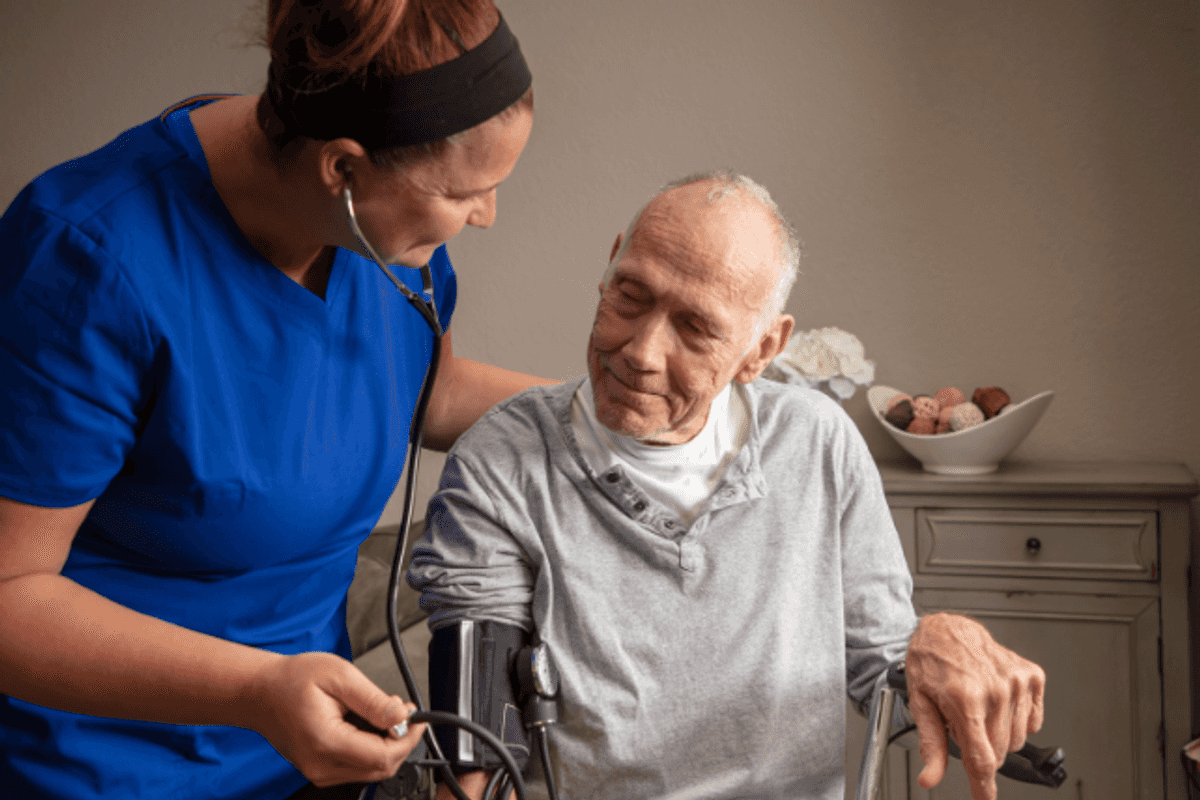
 A terminally ill woman in her hospital bed. via
A terminally ill woman in her hospital bed. via 
 Family baking fun in the kitchen.
Family baking fun in the kitchen. Three generations smiling by the sea.
Three generations smiling by the sea.
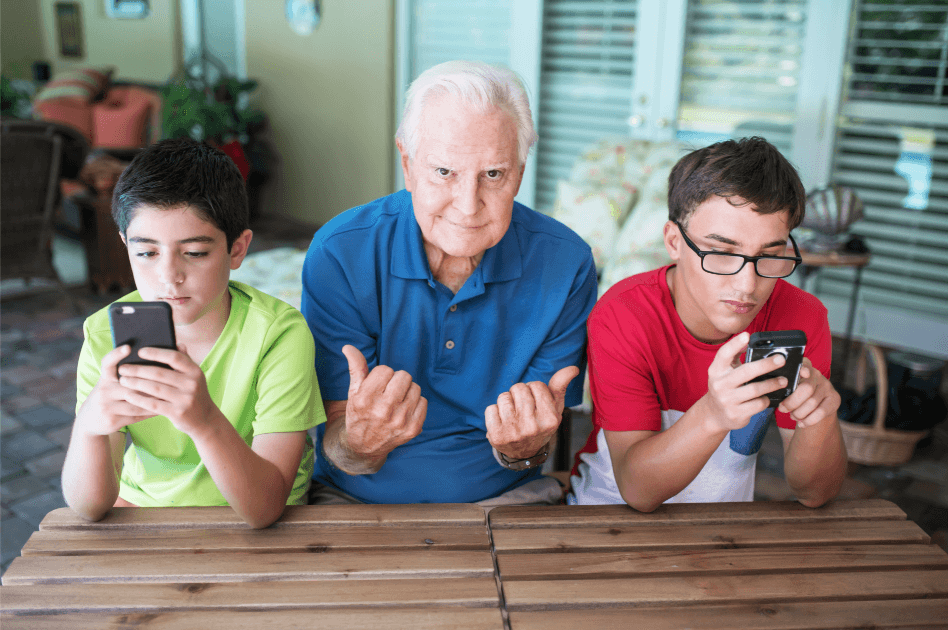 A grandpa with his grandsons on their smartphones.
A grandpa with his grandsons on their smartphones. 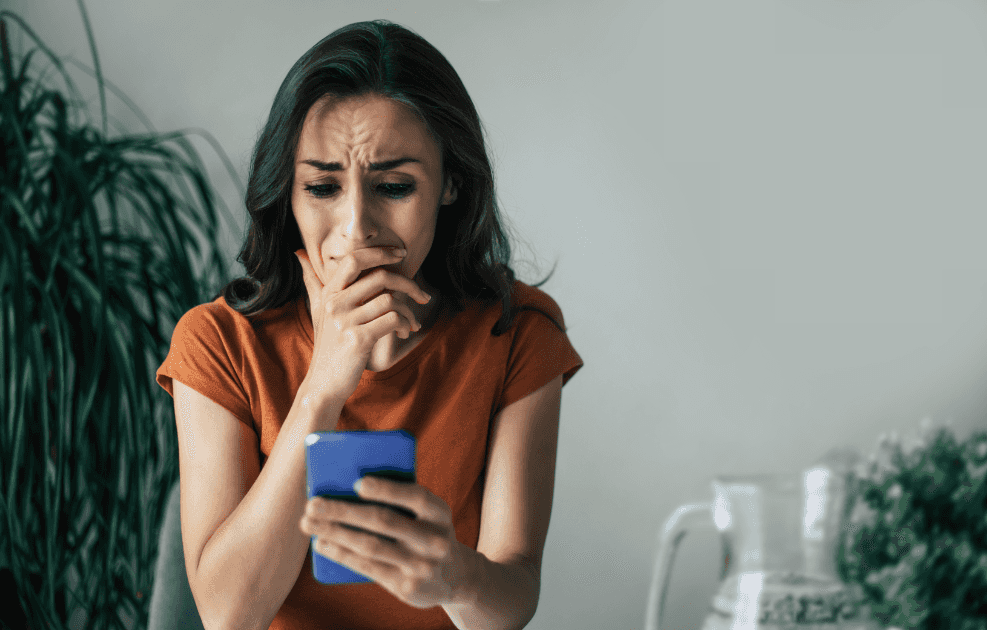 Young woman crying while holding her phone.
Young woman crying while holding her phone.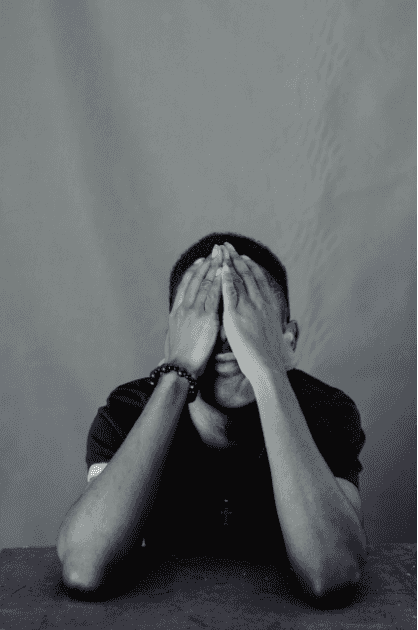 Boy with his head in his hands.
Boy with his head in his hands.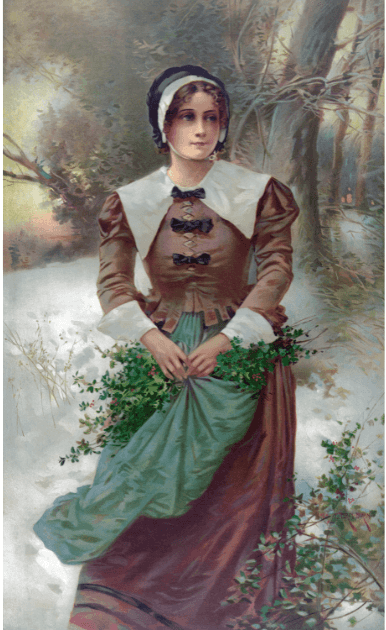 "A Fair Puritan" by E. Percy Moran, 1897.
"A Fair Puritan" by E. Percy Moran, 1897.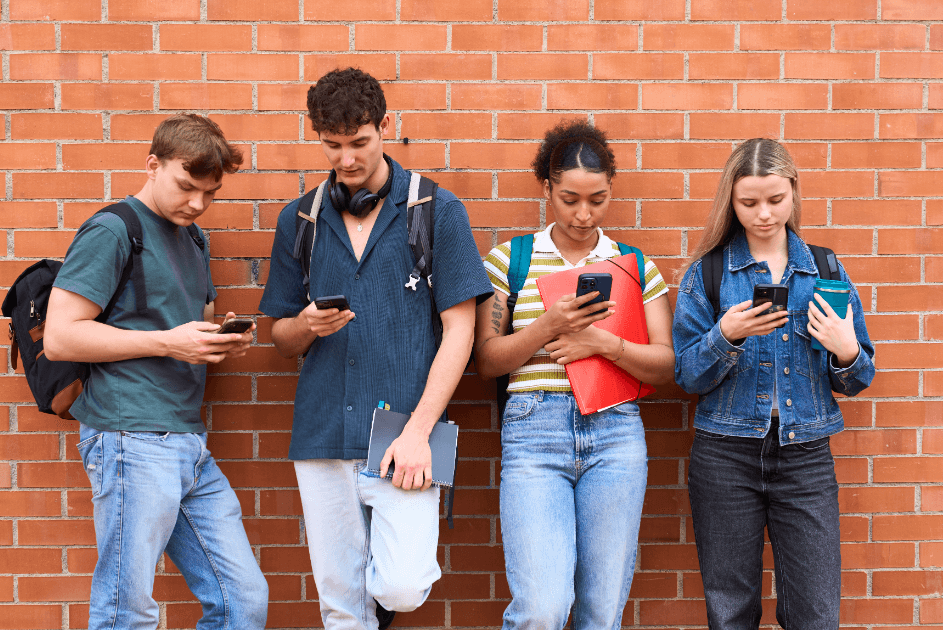 Kids glued to their phones.
Kids glued to their phones.
 Katie's skin condition made it hard to attract a rescuer. Courtesy of
Katie's skin condition made it hard to attract a rescuer. Courtesy of  Katie's potential for love is so clear. Couresty of
Katie's potential for love is so clear. Couresty of